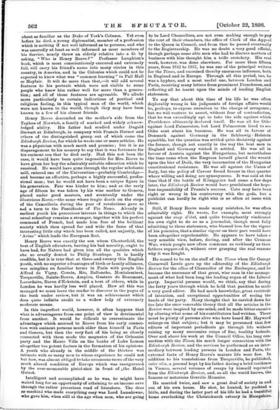to be Lord Chancellors, are not even making enough to
pay the rent of their chambers, the office of Clerk of the Appeal to the Queen in Council, and from that he passed eventually to the Registrarship. He was no doubt a very good official, though perhaps some able men who had to discuss matters of business with him thought him a trifle crotchety. His real work, however, was done elsewhere. For more than fifteen years, from 1842 to 1857, he was one of the principal writers for the Times, and exercised thereby enormous influence, both in England and in Europe. Through all this period, too, he was a hyphen, and a most useful one, between London and Paris, receiving many letters from prominent Frenchmen, and reflecting all he learnt upon the minds of leading English statesmen.
To say that about this time of his life he was often deplorably wrong in his judgments of foreign affairs would be, perhaps, to expose ourselves to the charge of arrogance; but we will venture to assert, without fear of contradiction, that he was exceedingly apt to take the side against which Providence ultimately declared itself. He was all for Otho against Lord Palmerston, but Lord Palmerston lived to see Otho sent about his business. He was all in favour of Denmark against Germany in the Schleswig - Holstein squabble, but the question was settled quite decisively against the former, though not exactly in the way the best men in England and Germany wished it settled. He was all in favour of Austria against the Hungarians, but nevertheless the time came when the Empress herself placed the wreath upon the bier of Derik, the very incarnation of the Hungarian constitutional resistance. He was all against the Union of Italy, but the policy of Cavour found favour in that quarter where willing and doing are synonymous. It was said at the time'that if the battle of Sdniggratz had come a few days later, the Edinburgh Review would have proclaimed the hope- less impossibility of Prussia's success. Cato may have been right or wrong in his controversy with the gods, but a publicist can hardly be right who is so often at issue with them.
Still, if Henry Reeve made many mistakes, he was often admirably right. He wrote, for example, most strongly against the coup d' glut, and quite triumphantly vindicated his own right to do so as a journalist, though most fully admitting to those statesmen, who blamed him for the vigour of his polemics, that a similar vigour on their part would have been altogether reprehensible. He appears to have taken a very sensible view, before, during, and after the Crimean War, which people now often condemn as recklessly as their fathers supported it, without ever grasping the real reasons why it was fought.
He ceased to be on the staff of the Times when Sir George Cornewall Lewis gave up the editorship of the Edinburgh Review for the office of Chancellor of the Exchequer, and he became the successor of that great, wise man in the manage' went of what had been long the leading organ of the Liberal party. Impartial persona would, we think, say that during the forty years through which he held that position he made a very good editor. He had much knowledge, great rectitude of intention, and exceptional opportunities of seeing the heads of the party. Many thought that he carried down far too late the once venerable theory that all the articles in the Review were inspired by one mind, and he made bitter enemies by altering what some of his contributors had written. There must be plenty of persons alive who have heard Mr. Hayward enlarge on that subject; but it may be presumed that few editors of important periodicals go through life without raising up many successive crops of fine, healthy hatreds. Over and above his work at the Council Office, his long con- nection with the Times, his much longer connection with the Edinburgh Review, and the services he performed as an inter- mediary between leading persons in London and Paris, the external facts of Henry Reeve's mature life were few. In addition to his translations from Tocqueville, he published, infer cilia, a journal kept by his father during a brief residence in Vienna, several volumes of essays by himself reprinted from the Edinburgh Review, and, as all the world knows, the famous or notorious Greville Memoirs.










































 Previous page
Previous page